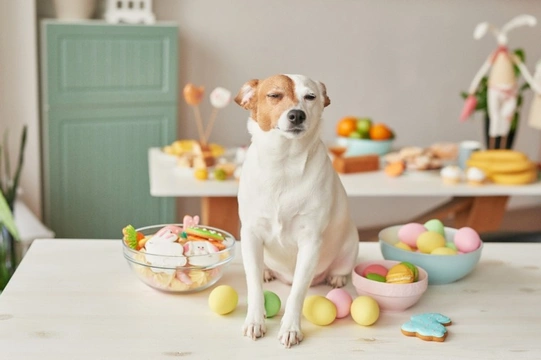
What can my dog have on their Easter dinner?
If you’re spending hours making a huge roast dinner for your family for Easter, your dog will probably be very keen to let you know that they’d like a portion of this too. There is no reason why you should share your roast with your dog any more than you should any other meal, and giving dogs scraps or human food isn’t a good idea in general.
That said, occasionally and as a special treat it is ok to let your dog have something a bit different, if you’re careful about what you give them. So, what can your dog have on their Easter dinner? This article will tell you. Read on to learn more.
General guidelines for what you can feed a dog at Easter
First of all, even if you gave a dog a bowl of food that was carefully assessed to make sure nothing in it was actually poisonous to your dog, if you feed them too much, or too much of what you give them is fatty, you can still make them quite sick!
Avoid giving your dog foods containing salt or sugar, nor anything with too much fat in it. Look to lean meats, and cull vegetables that have been cooked in fat.
Be cautious about what is in or garnishing foods you did not make from scratch yourself, as many pre-prepared food or packet mixes contain hidden ingredients.
Remember, nothing from the onion family (onion, garlic, leek and so on) can be fed to dogs, nor can anything like grapes, raisins, and sultanas.
What easter vegetables can my dog eat?
Depending on what you’re actually cooking on your Easter roast, there should be quite a few vegetables that your dog can enjoy too. Some dogs will be keen to eat (or not notice) veg if it is covered in gravy, while others might be a bit more take it or leave it, but several Easter vegetables are safe for dogs.
Carrots are fine for dogs, although it is best not to give a dog carrots that are cut into rounds, as these might be just the right shape and size to lodge in your dog’s windpipe, which can potentially cause choking.
Dogs can also eat celery, green beans, and peas. They can eat corn off the cob too, and also squash, sweet potato, potato, cauliflower, and broccoli.
Dogs cannot eat leeks, onion garlic, or any other products from this family. Also, when it comes to the vegetables that dogs can eat at Easter, don’t give them veg that has been cooked in goose or duck fat (like potatoes sometimes are) or covered in butter, as this is all too fatty and rich for them.
Take care to ensure there’s no garlic and not a lot of salt or pepper garnish used on the veg either.
Can my dog eat roast lamb at Easter?
Roast lamb is perhaps the most common and popular meat we eat for our Easter roast dinners, and lamb in and of itself is not toxic to or dangerous to dogs. It can, however, be dangerous depending on how you prepare it (once more, garlic, and plants from that family are toxic to dogs).
You should also never give your dog cooked lamb bones; while a shank or long leg bone is fine and a nice treat for a dog when raw, cooked bones are dangerous for dogs and can splinter and cause them an injury.
Bear in mind too that lamb is a very fatty meat, and so you should trim lean pieces for your dog and only feed them a small amount of lamb!
Can my dog eat Easter ham?
Your dog can have a small amount of an Easter ham too, although avoid giving them very salty ham or smoked ham and again, trim the fat and don’t give them too much of it.
Beware of seasonings and any hidden ingredients in a ham glaze; and if the ham joint was roasted rather than cured, don’t be tempted to give them the large bone from a leg of ham either, as just as is the case with a cooked lamb bone, this will be apt to splintering.
Can my dog have Easter gravy?
If you make a gravy mixture that is low salt and vitally, not made with garlic or onion (or made from juices from meats and veg that include garlic or onion) then your dog can have this. Most of us make seasoned gravy though or add juice from the meat; so you might want to make up a special plain gravy for your dog instead, once more, taking care to use one that does not include onion.
What Easter sweets can my dog have?
When it comes to the vast majority of the sweet food we eat at Easter, none of these are ok to feed to a dog. Easter eggs are made of chocolate and so too are a great many of the cakes and treats we buy or make at home.
Those that aren’t (like Simnel cake and hot cross buns) usually contain raisins and/or sultanas, which are toxic to dogs in their turn.



